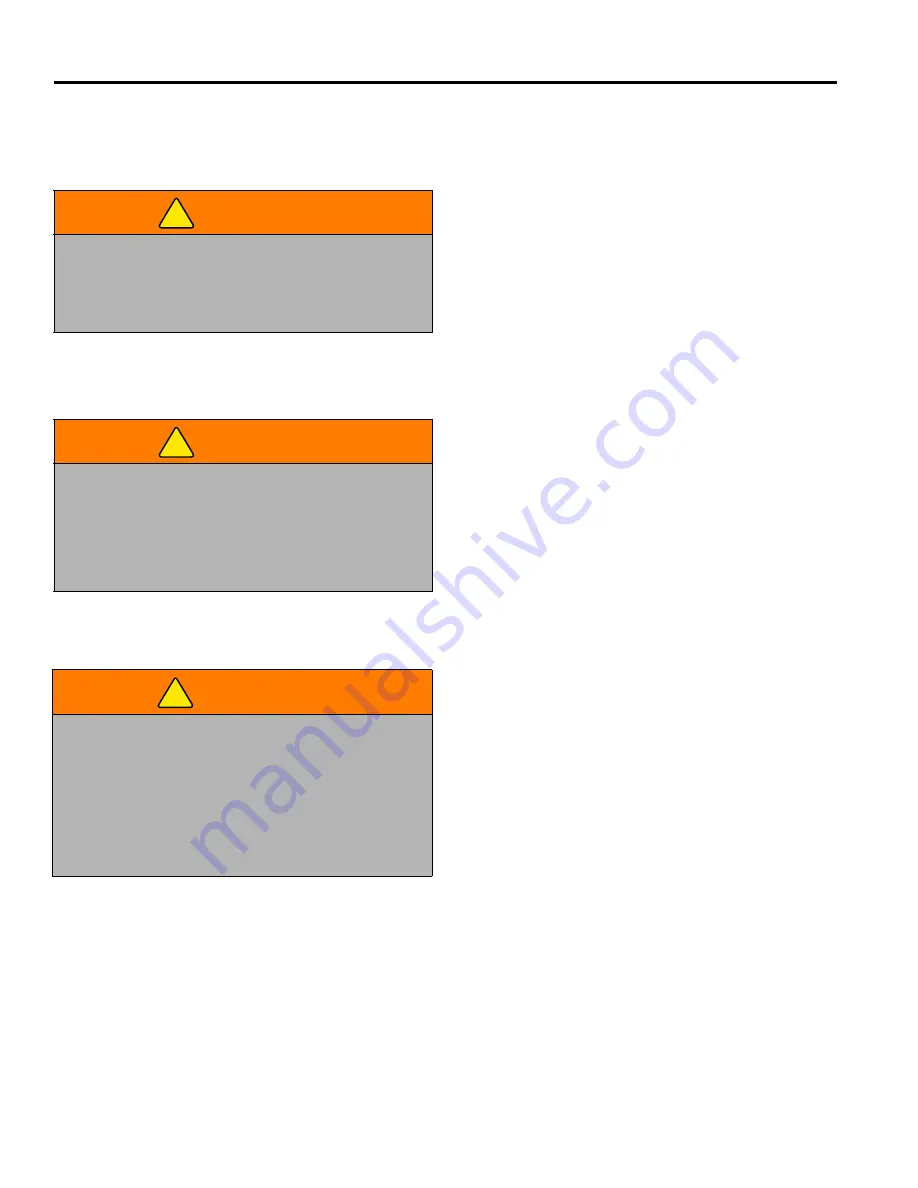
4 MAINTENANCE
20
4.8
JUMP STARTING __________________________________________________________
Before attempting to “jump start” the mower, check the
condition of the discharged battery.
Section 4.7
When connecting jumper cables:
1.
Stop the engine on the vehicle with a good battery.
2.
Connect RED jumper cable to the positive (+) terminal
on the good battery and to the positive (+) terminal on
the “discharged” battery.
3.
Connect the BLACK jumper cable from the negative
(-) terminal on the good battery to the frame
of the
mower with the discharged battery.
After cables have been connected, start the engine on the
vehicle with the good battery then start the mower.
4.9
CHARGING BATTERY _____________________________________________________
1.
Refer to
Section 4.7
. Read the Battery and Charger’s
manual for specific instructions.
2.
Whenever possible, remove the battery from the
mower before charging. If battery is not sealed, check
that the electrolyte covers the plates in all the cells.
3.
Make sure the charger is Off Then connect the charger
to the battery terminals as specified in the charger’s
manual.
4.
Always turn the charger Off before disconnecting
charger from the battery terminals.
4.10 HYDRAULIC HOSES _______________________________________________________
1.
Always lower implements to ground, disengage all
drives, engage parking brake, stop engine, and remove
key before inspecting or disconnecting hydraulic lines or
hoses.
2.
Check visible hoses and tubes daily. Look for wet
hoses or oil spots. Replace worn or damaged hoses
and tubes before operating the machine.
3.
The replacement tube or hoses must be routed in the
same path as the existing hose, do not move clamps,
brackets, and ties to a new location.
4.
Thoroughly inspect all tubes, hoses, and connections
every 250 hours.
IMPORTANT:
The hydraulic system can be
permanently damaged if the oil becomes
contaminated.
Before disconnecting any hydraulic
component, clean the area around fittings and hose
ends to keep impurities out of the system.
a.
Before disconnecting any hydraulic component, tag
or mark the location of each hose then clean the
area around the fittings.
b.
As you disconnect the component, be prepared to
assemble plugs or caps to the hose ends and open
ports. This will keep impurities out of the hydraulic
system and also prevent oil spills.
c.
Make sure “O” rings are clean and hose fittings are
properly seated before tightening.
d.
Keep the hose from twisting. Twisted hoses can
cause couplers to loosen as the hose flexes during
operation resulting in oil leaks.
e.
Kinked or twisted hoses can restrict the oil flow
causing the system to malfunction and the oil to
overheat and also lead to hose failure.
WARNING
Batteries generate explosive hydrogen gas. To reduce
the chance of an explosion, avoid creating sparks near
battery. Always connect the negative jumper cable to the
frame of the mower with the discharged battery, away
from the battery.
!
WARNING
Charge battery in a well ventilated area. Batteries
generate explosive gases. To prevent an explosion, keep
any device that may create sparks or flames away from
the battery.
To prevent injury, stand away from battery when the
charger is turned on. A damaged battery could explode.
!
WARNING
To prevent serious injury from hot, high pressure oil,
never use your hands to check for oil leaks, use paper or
cardboard.
Hydraulic fluid escaping under pressure can have
sufficient force to penetrate skin. If fluid is injected into
the skin it must be surgically removed within a few hours
by a doctor familiar with this form of injury or gangrene
may result.
!
















































